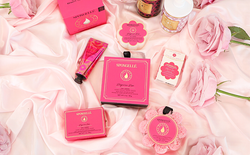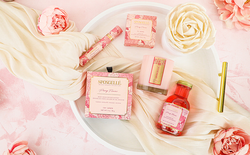Regularly showering is important for everyone’s skin health, but how often should you bathe? Showering frequency all depends on your daily schedule and a few other factors.
Not only will you smell if you don't shower enough (hello body odor), but it could also negatively affect your immune system and overall wellness. Meanwhile, showering too much could damage your skin's microbiome. It also depends on if you have certain skin conditions, such as eczema, dermatitis, or psoriasis (in which case, you should consult your dermatologist).
Find out how often you should be showering. We will also go over personal hygiene habits to set you up for success. Plus, we’ll discuss the best shower products you can use to leave you feeling clean and refreshed every day.
How Often Should You Shower?
No one knows your daily routine or your body like you do. Listen to your body when it comes to bathing. Some people need to shower more than once a day, while others can get away with showering every other day.
If you're hitting the gym every morning and working up a sweat, you probably need a shower before work. Then, by the time you go through your day, even if it's not strenuous, you should shower again before bed.
You also have to take your skin type into consideration when deciding how often you should shower. People with oily skin may need to shower daily. However, if you're dealing with really dry skin, you can opt to miss a shower and skip right to moisturizer.
You can also take the season into account. People tend to sweat more during the hotter months of the year and may need to shower more frequently. Once winter rolls around and you're not sweating as much, and your skin gets drier, you can afford to shower less.
Regardless of your skin type or the time of the year it is, you don't want to go more than two days without a shower. You have dead skin that flakes and needs to be washed away. Plus, dirt and other impurities will begin to build up, even if you didn't leave your house.
Can You Shower Too Much?
There are times when you can overdo it in the shower. It can dry out your skin, which impacts your skin barrier. Your skin barrier locks moisture in and keeps impurities out. When the protective layer is compromised, you can be more susceptible to infections.
While a super hot shower may feel good at first, it can have harmful effects on your skin. The temperature can throw off your skin's balance of natural oils, moisture, fats, and protein. Instead, opt for lukewarm water. You may miss your scalding hot showers a little, but your skin will thank you.
Make your night shower the one where you thoroughly clean your body. If you're showering after a workout, think of it more as a quick rinse. Your skin will be much healthier and balanced.
If you're the type of person that showers multiple times a day, you may want to cut back. If you can't take fewer showers, you can change the way you bathe. Switch to a shower routine that includes gentle soap that easily lathers.
Use gentle cleansers and steer clear of exfoliative products. Certain cleansers can affect your pH balance and irritate your skin. Look for a product with nourishing ingredients, like Spongellé's French Lavender Body Wash.
It contains amino acids that provide 48 hours of moisture and restoration. The body wash also has Pro-Vitamin B5 to stabilize your skin's natural barrier. It's free of sulfates, parabens, gluten, and harsh solvents.
Who Should Be Showering Daily?
Some people can't afford to skip a shower and need to bathe daily. If you have a job where you are exposed to allergens, chemicals, or bodily fluids, or you sweat a lot, you need to be showering every day.
Some of the jobs that will require you to be in the daily shower category are:
- Healthcare workers
- Farmers
- Landscapers
- Veterinarians
- Fitness instructors
- Construction workers
These professions generally leave you pretty dirty. They also can expose you to things that can impact your health. Washing the day off will be an important part of your routine when you get home from work.
Skipping Showers
Maybe you hate having to shower, and you skip it fairly often. What's the worst that can happen? It depends, but it's not great. The odor will be one of the first consequences of not showering. No one wants to be around a smelly person.
You may also notice a host of skin issues and flare-ups of pre-existing skin conditions. One of the most common skin problems that can arise from poor hygiene is acne. Blemishes can pop up on your chest, back, and face due to clogged pores.
Acne-causing bacteria can become trapped in your pores, resulting in a breakout. Dirt, oil, and dead skin cells can also become stuck in your pores. Showering and removing these things can help prevent acne.
If you go months without showering, more serious issues can arise. You may also notice brown patches on your body, which are dead skin cells, dirt, and grime trapped on your skin. This condition can be treated by simply washing the affected area regularly.
Use Spongellé's Petitgrain Botanica Body Buffer to help you remove impurities. You can buff away dirt and oil and infuse your skin with nourishing herbal extracts at the same time. Petitgrain is a fresh scent that's accompanied by notes of bitter orange and extracts of rosehip, hibiscus, and green tea.
Plus, the buffer is resistant to bacterial growth and contamination. It won't harbor harmful impurities like traditional loofahs. You do need to hang it up to dry after you shower.
How To Shower Properly
Once you have the number of showers you should be taking down, you should focus on how you shower. There are some main areas you need to focus on when you bathe. Your scalp, armpits, groin, and your feet are the places that need the most attention.
Your hair products and body wash will help remove the necessary grime. You don't need to cover every inch of your body in soap. If you’re experiencing dryness or sensitive skin, you can hit the main areas above and leave the rest of your skin alone. Sometimes your whole body needs a scrub down, like after a hike or gardening.
As far as the order you should do your shower routine in, focus on your hair first. Shampoo your hair, making sure to focus on your scalp. Next, use a conditioner to add hydration back to your strands.
Once your hair is clean, move onto your body. Clean the necessary areas with your buffer or washcloth. You can gently scrub, but avoid rubbing too hard since it can irritate your skin.
Finish your shower with any necessary shaving. Your hair follicles will be soft, and the razor will be able to glide easily over your skin. It will help you avoid redness and bumps.
Once you get out of the shower, pat yourself dry and finish with a moisturizer. Try Spongellé's Honey Blossom Body Lotion to replenish your skin. It contains a combination of shea butter, jojoba oil, and vitamin E to pamper your skin.
How Long Should You Shower?
The amount of time you spend in the shower also matters. We know not all showers are created equal. Sometimes you may be in and out in a couple of minutes, and other times you might be in there for almost an hour. However, how long should your ideal shower be?
The more time you spend exposing your skin to hot water, the worse the negative effects can be on your skin and hair. You should aim for a five to 10-minute shower routine. This time frame should be pretty easy, especially if you don't need to wash your hair every day.
Smart Shower Tips
Here are the things to remember when it comes to showering.
- Warm water: Replace your hot showers with warm ones to protect your skin.
- Get in and out: Five to 10 minutes is the perfect amount of time.
- Non-drying soap: Use a hydrating body wash that won't strip your skin.
- Wash select areas: Focus on areas prone to being the dirtiest and smelliest.
- Moisturize After: Even if you don't struggle with dry skin, always moisturize after your shower. Leave your skin a little damp to lock in added hydration.
- Don't use dirty loofahs: Damp loofahs can become breeding grounds for bacteria. Use a Spongellé buffer instead since it's resistant to bacteria.
Shower Ready
Showering should be a part of your regular personal hygiene routine. You may need to shower more or less than someone else. The frequency you need to bathe depends on your lifestyle.
No matter how often you need to shower, Spongellé products are the best products to have on hand. The body washes, buffers, and lotions will help your skin stay clean and nourished.
Sources:
How Often Should You Shower? | Very Well Health
What to Know About Your Skin Barrier and How to Protect It | Web MD















